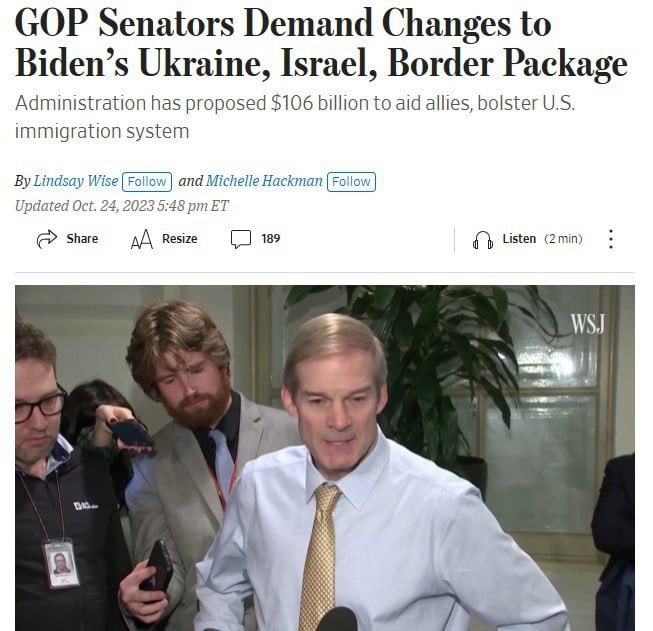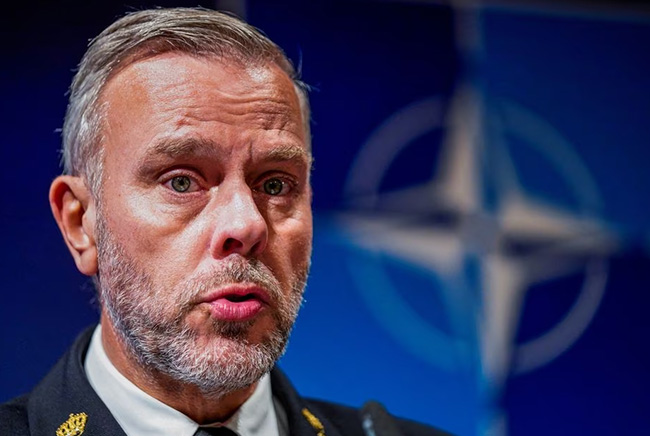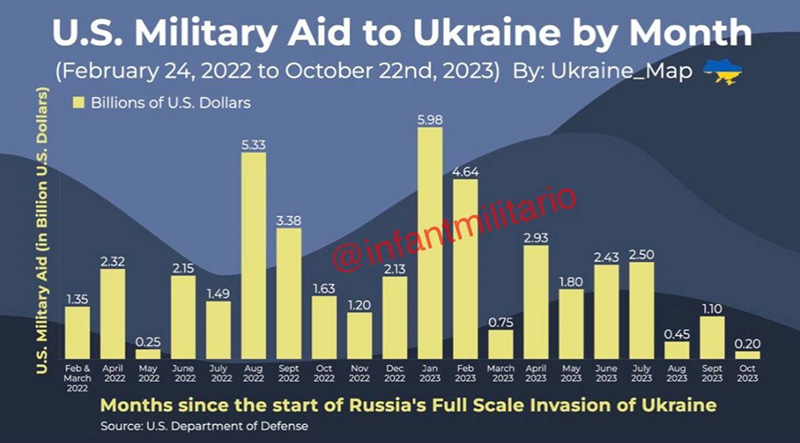
Senate Republicans want changes to the Biden administration’s request for $106 billion in emergency funds for Ukraine, Israel and Taiwan and to manage the flow of migrants at the U.S. border.
There is broad bipartisan support in Congress for aid to Israel, following the deadly attack by Hamas earlier this month. But some Republicans are skeptical of new funding for Ukraine, while others would prefer to finance weaponry instead of humanitarian aid or direct economic assistance to the Ukrainian government. Congress has approved more than $100 billion for Ukraine since Russia invaded in early 2022.
Senate Minority Leader Mitch McConnell (R., Ky.) said that he is generally supportive of the administration’s big-picture approach — he didn’t object to the price tag — but he made it clear he plans to push for some changes, with an emphasis on border policy.
“It’s pretty clear that the supplemental that was sent up is just a certain starting point,” McConnell said at his weekly press conference Tuesday. “We’re gonna go over it with a fine-tooth comb. As you can see, there’s a lot of passion among our members about having a credible border security provision in there, and we’re gonna make other changes as well.”
Last week, Sen. Tom Cotton (R., Ark.), a close McConnell ally, called the administration’s proposal “dead on arrival.” He said Senate Republicans would take the lead on crafting an alternative funding bill, while laying out some of the Republicans’ top problems with the administration’s request.
Some Republicans want the Israel aid separated from the Ukraine aid, a nod to the fact that the latter has become politically unpopular with their party’s voters and a number of Republican lawmakers.
“The Senate needs to vote on aid for Israel now — by itself,” said Sen. Rick Scott (R., Fla.) Tuesday. “Everyone in Washington knows what the president has proposed will never pass the House.” These are two separate conflicts and it would be wrong to leverage support of aid to Israel in [an] attempt to get additional aid for Ukraine across the finish line.
“Even though I am in favor of aid to Ukraine, I don’t think it’s fair to members to link the two together,” said Rep. Ken Calvert (R., Calif.) of Ukraine and Israel assistance, informs ‘The Wall Street Journal’.

Admiral Rob Bauer, head of the North Atlantic Treaty Organization's military committee (photo), called on member countries to stop protecting national arms makers, whose current business model he compared to that of companies producing printers. Reuters informs.
"The manufacturer will not get rich because of the printers that they make, but because of the ink," Bauer told Reuters in an interview.
"If you make an artillery round that only fits in the gun that you make, then you force the users to buy your ammunition."
According to Bauer, the price for one artillery shell has gone up to 8,000 euros ($8,489.60) from 2,000 euros before the conflict in Ukraine.
Western countries have been scrambling to boost the output of artillery shells as Kyiv, firing thousands of rounds a day, has been burning through supplies much faster than the allies can produce them.
While there is a NATO standard for artillery ammunition, its implementation is voluntary and a lack of adherence by various countries has led to a fragmentation of the market and hampered the flow of supplies.
Bauer said 14 NATO nations reserved the right to deviate from the standard, meaning there were 14 different types of 155 millimetre ammunition.
He attributed the backsliding on standardisation to a defence market that has shrunk drastically since the Cold War, when NATO countries spent 3%-6% of GDP on the military.
"The number of buyers went down, the amount of money went down, and so everybody was protecting their own industry," the admiral noted, saying that, during the Cold War "everybody was getting a piece of the pie".
However, referring to significantly increased defence spending in previous years, Bauer said he was convinced that for the next 15 years there was enough money to be earned for the industry.
With NATO nations in the process of replenishing inventories depleted by donations to Kyiv, Bauer said now was the right time to break the cycle and make a new push for standardisation, also with a view to other areas such as transportation and medical supplies.

read more in our Telegram-channel https://t.me/The_International_Affairs

 11:10 26.10.2023 •
11:10 26.10.2023 •






















